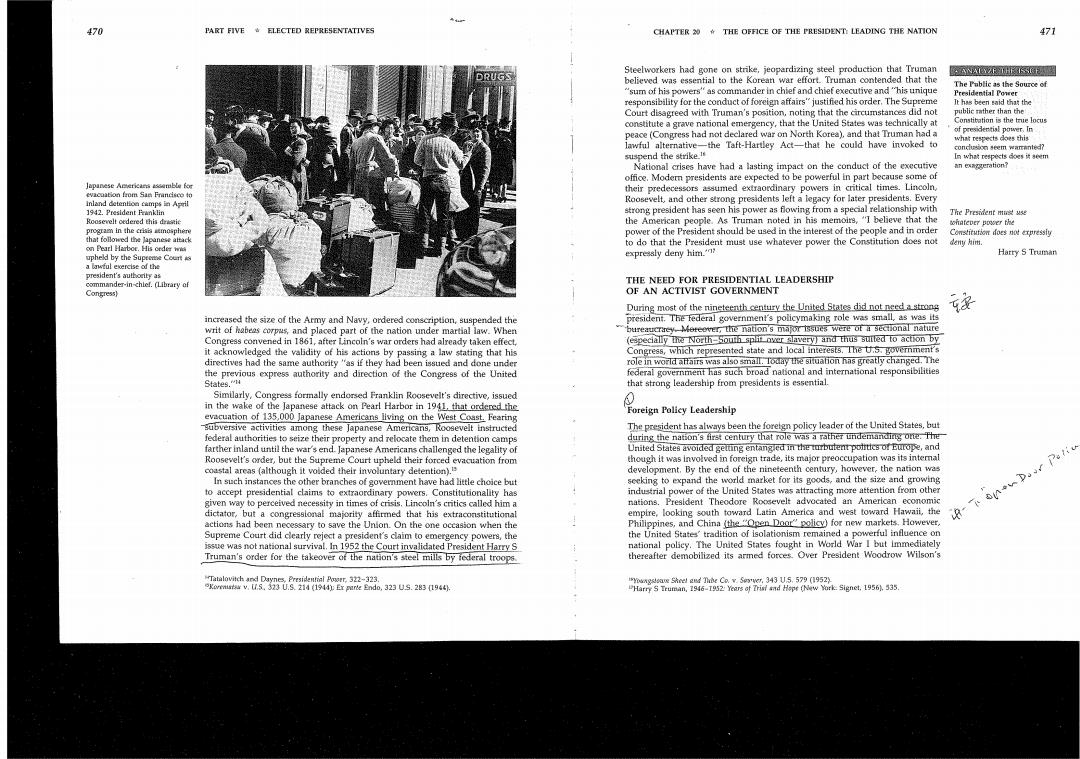正在加载图片...

470 PART FIVE ELECTED REPRESENTATIVES CHAPTER 20*THE OFFICE OF THE PRESIDENT LEADING THE NATION 471 Steelworkers had gone on strike,jeopardizing steel production that Truman DRUGS ANAL图 believed was essential to the Korean war effort.Truman contended that the The Public as the Source of "sum of his powers"as commander in chief and chief executive and "his unique responsibility for the conduct of foreign affairs"justified his order.The Supreme been taid时h Court disagreed with Truman's position,noting that the circumstances did not the红than the constitute a grave national emergency,that the United States was technically at onshbation ts the tuie locus peace(Congress had not deelared war on North Korea).and that Truman had a what respects does this lawful alternative-the Taft-Hartley Act-that he could have invoked to condusion seem waranted? suspend the strike In what respects does geem National crises have had a lasting impact on the conduct of the executive office.Modern presidents are expected to be powerful in part because some of Japanese Americans assumble for their predecessors assumed extraordinary powers in critical times.Lincoln. evacuation from San Francisco to Inland detention camps in April Roosevelt,and other strong presidents left a legacy for later presidents.Every 1942.President Franklin strong president has seen his power as flowing from a special relationship with The President mus装 Roosevelt oedered this drastie the American people.As Truman noted in his memoirs,"I believe that the the power of the President should be used in the interest of the people and in order to do that the President must use whatever power the Constitution does not deyi出. uphel by the expressly deny him. Harry S Truman ful exercise of the president's authority as commander-in-chlef.(Library of THE NEED FOR PRESIDENTIAL LEADERSHIP Congress) OF AN ACTIVIST GOVERNMENT During most of the nineteenth century the United States did not need a strong increased the size of the Army and Navy,ordered conscription,suspended the president.The federal government's policymaking role was small,as was its writ of habeas corpus,and placed part of the nation under martial law.When bureaucrrey.Mereever,the nation's major issues were of a sectional nature Congress convened in 1861,after Lincoln's war orders had already taken effect (especially the North-South split over slavery)and thus suiled to action by it acknowledged the validity of his actions by passing a law stating that his Congress,which represented state and local interests.Thegovermens directives had the same authority "as if they had been issued and done under role in world affairs was also small.Today the situation has greatly changed.The pauthority and irction of the Comgreas of the United federal government has such broad national and international responsibilities that strong leadership from presidents is essential. Similarly,Congress formally endorsed Franklin Roosevelt's directive,issued 0 in the wake of the Japanese attack on Pearl Harbor in 1941,that ordered the Foreign Policy Leadershlp evacuation of 135,000 Japanese Americans living on the West Coast.Fearing Subversive activities among these Japanese Americans,Roosevelt instructed The president has always been the foreign policy leader of the United States,but federal authorities to seize their property and relocate them in detention camps during the nation's first century that role was a rather undemanding one.The farther inland until the war's end.Japanese Americans challenged the legality of United States avoided getting entangled in the turbutent polrttes of Europe,and Roosevelt's order,but the Supreme Court upheld their forced evacuation from though it was involved in foreign trade,its major preoccupation was its intemal coastal areas (although it voided their involuntary detention). development.By the end of the nineteenth century,however,the nation was In such instances the other branches of government have had little choice but seeking to expand the world market for its goods,and the size and growing to accept presidential claims to extraordinary powers.Constitutionality has industrial power of the United States was attracting more attention from other given way to perceived necessity in times of crisis.Lincoln's critics called him a nations.Presldent Theodore Roosevelt advocated an American economic dictator,but a congressional majority affirmed that his extraconstitutional emptre,looking south toward Latin America and west toward Hawaii,the actions had been necessary to save the Union.On the one occasion when the Philippines,and China (the "Open Door"policy)for new markets.However, Supreme Court did clearly reject a president's claim to emergency powers,the the United States'tradition of isolationism remained a powerful influence on issue was not national survival.In 1952 the Court invalidated President Harry S national policy.The United States fought in World War I but immediately Truman's order for the takeover of the nation's steel mills by federal troops thereafter demobilized its armed forces.Over President Woodrow Wilson's Tatalovitch and Dayr 343U5.579.9524 Korentv.US,323U.S.214(1944 Ex punle End0,323US.283L94. i (New York Signet,1956)535